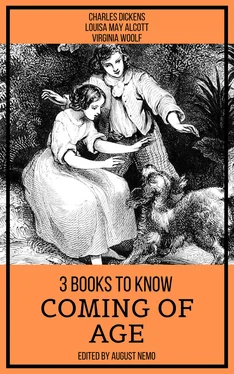"Where have you been, you young monkey?" said Mrs. Joe, stamping her foot. "Tell me directly what you've been doing to wear me away with fret and fright and worrit, or I'd have you out of that corner if you was fifty Pips, and he was five hundred Gargerys."
"I have only been to the churchyard," said I, from my stool, crying and rubbing myself.
"Churchyard!" repeated my sister. "If it warn't for me you'd have been to the churchyard long ago, and stayed there. Who brought you up by hand?"
"You did," said I.
"And why did I do it, I should like to know?" exclaimed my sister.
I whimpered, "I don't know."
"I don't!" said my sister. "I'd never do it again! I know that. I may truly say I've never had this apron of mine off, since born you were. It's bad enough to be a blacksmith's wife (and him a Gargery) without being your mother."
My thoughts strayed from that question as I looked disconsolately at the fire. For, the fugitive out on the marshes with the ironed leg, the mysterious young man, the file, the food, and the dreadful pledge I was under to commit a larceny on those sheltering premises, rose before me in the avenging coals.
"Hah!" said Mrs. Joe, restoring Tickler to his station. "Churchyard, indeed! You may well say churchyard, you two." One of us, by-the-bye, had not said it at all. "You'll drive me to the churchyard betwixt you, one of these days, and oh, a pr-r-recious pair you'd be without me!"
As she applied herself to set the tea-things, Joe peeped down at me over his leg, as if he were mentally casting me and himself up, and calculating what kind of pair we practically should make, under the grievous circumstances foreshadowed. After that, he sat feeling his right-side flaxen curls and whisker, and following Mrs. Joe about with his blue eyes, as his manner always was at squally times.
My sister had a trenchant way of cutting our bread-and-butter for us, that never varied. First, with her left hand she jammed the loaf hard and fast against her bib—where it sometimes got a pin into it, and sometimes a needle, which we afterwards got into our mouths. Then she took some butter (not too much) on a knife and spread it on the loaf, in an apothecary kind of way, as if she were making a plaister—using both sides of the knife with a slapping dexterity, and trimming and moulding the butter off round the crust. Then, she gave the knife a final smart wipe on the edge of the plaister, and then sawed a very thick round off the loaf: which she finally, before separating from the loaf, hewed into two halves, of which Joe got one, and I the other.
On the present occasion, though I was hungry, I dared not eat my slice. I felt that I must have something in reserve for my dreadful acquaintance, and his ally the still more dreadful young man. I knew Mrs. Joe's housekeeping to be of the strictest kind, and that my larcenous researches might find nothing available in the safe. Therefore I resolved to put my hunk of bread-and-butter down the leg of my trousers.
The effort of resolution necessary to the achievement of this purpose, I found to be quite awful. It was as if I had to make up my mind to leap from the top of a high house, or plunge into a great depth of water. And it was made the more difficult by the unconscious Joe. In our already-mentioned freemasonry as fellow-sufferers, and in his good-natured companionship with me, it was our evening habit to compare the way we bit through our slices, by silently holding them up to each other's admiration now and then—which stimulated us to new exertions. To-night, Joe several times invited me, by the display of his fast-diminishing slice, to enter upon our usual friendly competition; but he found me, each time, with my yellow mug of tea on one knee, and my untouched bread-and-butter on the other. At last, I desperately considered that the thing I contemplated must be done, and that it had best be done in the least improbable manner consistent with the circumstances. I took advantage of a moment when Joe had just looked at me, and got my bread-and-butter down my leg.
Joe was evidently made uncomfortable by what he supposed to be my loss of appetite, and took a thoughtful bite out of his slice, which he didn't seem to enjoy. He turned it about in his mouth much longer than usual, pondering over it a good deal, and after all gulped it down like a pill. He was about to take another bite, and had just got his head on one side for a good purchase on it, when his eye fell on me, and he saw that my bread-and-butter was gone.
The wonder and consternation with which Joe stopped on the threshold of his bite and stared at me, were too evident to escape my sister's observation.
"What's the matter now?" said she, smartly, as she put down her cup.
"I say, you know!" muttered Joe, shaking his head at me in very serious remonstrance. "Pip, old chap! You'll do yourself a mischief. It'll stick somewhere. You can't have chawed it, Pip."
"What's the matter now?" repeated my sister, more sharply than before.
"If you can cough any trifle on it up, Pip, I'd recommend you to do it," said Joe, all aghast. "Manners is manners, but still your elth's your elth."
By this time, my sister was quite desperate, so she pounced on Joe, and, taking him by the two whiskers, knocked his head for a little while against the wall behind him: while I sat in the corner, looking guiltily on.
"Now, perhaps you'll mention what's the matter," said my sister, out of breath, "you staring great stuck pig."
Joe looked at her in a helpless way; then took a helpless bite, and looked at me again.
"You know, Pip," said Joe, solemnly, with his last bite in his cheek and speaking in a confidential voice, as if we two were quite alone, "you and me is always friends, and I'd be the last to tell upon you, any time. But such a—" he moved his chair and looked about the floor between us, and then again at me—"such a most oncommon Bolt as that!"
"Been bolting his food, has he?" cried my sister.
"You know, old chap," said Joe, looking at me, and not at Mrs. Joe, with his bite still in his cheek, "I Bolted, myself, when I was your age—frequent—and as a boy I've been among a many Bolters; but I never see your Bolting equal yet, Pip, and it's a mercy you ain't Bolted dead."
My sister made a dive at me, and fished me up by the hair: saying nothing more than the awful words, "You come along and be dosed."
Some medical beast had revived Tar-water in those days as a fine medicine, and Mrs. Joe always kept a supply of it in the cupboard; having a belief in its virtues correspondent to its nastiness. At the best of times, so much of this elixir was administered to me as a choice restorative, that I was conscious of going about, smelling like a new fence. On this particular evening the urgency of my case demanded a pint of this mixture, which was poured down my throat, for my greater comfort, while Mrs. Joe held my head under her arm, as a boot would be held in a boot-jack. Joe got off with half a pint; but was made to swallow that (much to his disturbance, as he sat slowly munching and meditating before the fire), "because he had had a turn." Judging from myself, I should say he certainly had a turn afterwards, if he had had none before.
Conscience is a dreadful thing when it accuses man or boy; but when, in the case of a boy, that secret burden co-operates with another secret burden down the leg of his trousers, it is (as I can testify) a great punishment. The guilty knowledge that I was going to rob Mrs. Joe—I never thought I was going to rob Joe, for I never thought of any of the housekeeping property as his—united to the necessity of always keeping one hand on my bread-and-butter as I sat, or when I was ordered about the kitchen on any small errand, almost drove me out of my mind. Then, as the marsh winds made the fire glow and flare, I thought I heard the voice outside, of the man with the iron on his leg who had sworn me to secrecy, declaring that he couldn't and wouldn't starve until to-morrow, but must be fed now. At other times, I thought, What if the young man who was with so much difficulty restrained from imbruing his hands in me, should yield to a constitutional impatience, or should mistake the time, and should think himself accredited to my heart and liver to-night, instead of to-morrow! If ever anybody's hair stood on end with terror, mine must have done so then. But, perhaps, nobody's ever did?
Читать дальше












